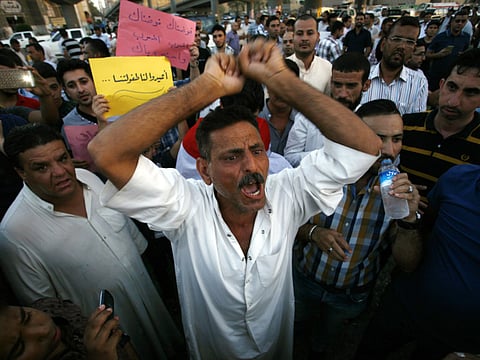Iraq parliament approves PM’s anti-corruption plan
The vote was held without a debate as soon as the plan was read

Baghdad: Iraq’s parliament on Tuesday unanimously approved Prime Minister Haider Al Abadi’s reform programme aimed at curbing corruption and reducing government waste that has sparked widespread anger and weeks of protests.
Al Abadi on Sunday proposed a series of measures to combat corruption, streamline the government and improve services after weeks of protests and a call from Iraq’s top Shiite cleric Grand Ayatollah Ali Al Sistani for drastic change.
“It was unanimously approved,” parliament speaker Salim Al Jubouri announced to applause after the vote, which was held without a debate as soon as the plan was read.
Of 328 members of parliament, 297 attended the session, Al Jubouri said.
Al Jubouri had urged MPs to sign off on the reforms proposed by Al Abadi, which have already been approved by the cabinet.
But he said that a complementary plan containing even more reforms was needed, and that Al Abadi should sack ministers who are guilty of negligence and corruption.
The second plan was also read and approved by parliament, and the session — most of which was taken up by the reading of the two plans — ended some 30 minutes after it began.
The approval is a victory for Al Abadi, but the question now becomes how thoroughly the measures will be implemented, and what politicians and other officials may do to try to thwart them.
“All Iraqi politicians officially support reform and the fight against corruption but they all engage very heavily in corruption,” said Zaid Al Ali, author of The Struggle For Iraq’s Future.
“They have to say that they support reform, but they will work against it.”
Amid a major heatwave that has seen temperatures top 50 degrees Celsius, protesters have railed against the poor quality of services, especially power outages that leave just a few hours of government-supplied electricity per day.
Thousands of people have turned out in Baghdad and various cities in the south to vent their anger at the authorities, putting pressure on them to make changes.
Various parties and politicians have sought to align themselves with the protesters’ calls for reforms to benefit from the movement and mitigate the risk to themselves.
People have protested over services and corruption before, but the demonstrations failed to bring about significant change.
Protesters’ demands were given a boost on Friday when Al Sistani, who is revered by millions, called for Al Abadi to take “drastic measures” against corruption, saying that the “minor steps” he had announced were not enough.
Al Abadi rolled out the reform programme two days later.
One of the most drastic of Al Abadi’s proposals, which were approved by the cabinet on Sunday, was the call for the posts of vice-president and deputy prime minister to be eliminated “immediately”.
On Tuesday, Al Abadi described the vice-president and deputy premier positions as “one of the entrances to corruption.”
The plan further sidelines Vice-President Nouri Al Maliki, a former prime minister widely blamed for inflaming sectarian tensions and staffing the military with less-qualified supporters, paving the way for Daesh’s rapid advance across northern and western Iraq last year.
Al Maliki reluctantly stepped aside a year ago, but is widely believed to exert power from behind the scenes. He expressed support for the reform plan, which was approved by the Cabinet on Sunday.
The reforms will dismantle parts of the top-heavy government created in the wake of the 2003 US-led invasion that toppled dictator Saddam Hussain. The tripartite offices were intended to give equal representation to Iraq’s Shiite majority and its Sunni and Kurdish minorities. It calls for the elimination of “political and sectarian quotas” for senior officials, for increased oversight to prevent corruption, and for services to be improved, among other measures.
The overhaul would reduce spending on the personal bodyguards of officials and transfer responsibility to the interior and defence ministries. The plan also calls for a review of all corruption cases by a committee of experts, with fresh trials for officials suspected of wrongdoing.



